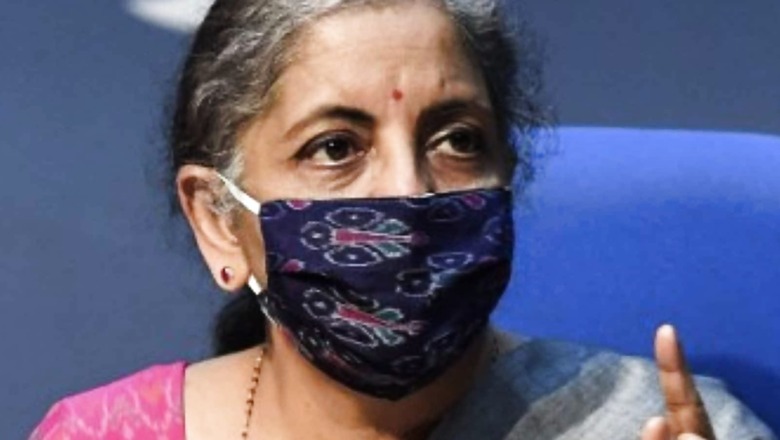
views
Washington: Ensuring equitable vaccines for all is a key to the global economic recovery but it faces a significant challenge, Union Finance Minister Nirmala Sitharaman told her G-20 counterparts on Wednesday.
In her remarks at the G20 Finance Ministers and Central Bank Governors Meeting, held on the sidelines of the Annual Meetings of the International Monetary Fund and the World Bank, Sitharaman said for the global economic recovery, it is essential to keep up the support, build resilience and enhance productivity and structural reforms.
These should be our policy goals, Sitharaman said at the in-person meeting of the Fourth G20 Finance Ministers and Central Bank Governors (FMCBG) under the Italian presidency.
G-20 countries agreed to avoid any premature withdrawal of support measures while preserving financial stability and long-term fiscal sustainability besides safeguarding against downside risks and negative spillovers.
The meeting, the last one under the Italian Presidency, also saw discussions and agreements on various issues of global economic recovery, pandemic support to vulnerable countries, global health, climate action, international taxation and financial sector issues.
Appreciating the G-20’s role in rallying the pandemic response and supporting vulnerable countries through debt relief measures and the new SDR allocation, Sitharaman suggested focusing efforts on making the benefits reach the intended countries.
Participating in the discussion on climate change, the finance minister emphasised that considering the varied policy spaces and different starting points of countries, the centrality of climate justice based on the United Nations Framework Convention on Climate Change and principles of the Paris Agreement would be critical for taking forward discussions towards successful outcomes.
She rued that the failure in fulfilling the existing international commitments on climate finance and technology weakens the collective efforts of the global community in the fight against climate change.
Sitharaman asked for climate justice to guide further discussions.
In her remarks, the finance minister appreciated the recent OECD decision of OECD on global tax.
This agreement, she noted, helps to address tax challenges arising from the digitalization of the economy and in dealing with Base Erosion and Profit Shifting issues.
For addressing tax challenges arising from the digitalisation of the economy, the G20 FMCBGs endorsed the final agreement as set out in the statement on a two-pillar solution and the Detailed Implementation Plan released by the OECD/G20 Inclusive Framework on Base Erosion and Profit Shifting (BEPS) on October 8, 2021. The G-20 meeting of finance ministers and governors of central banks discussed a range of other topics, including the current macroeconomic conditions, further progress on reforms to international taxation, coordination on vaccine distribution and long-term pandemic preparedness.
They also discussed efforts within the G20 Finance Track on climate change mitigation and financial regulatory issues. US Treasury Secretary Janet Yellen and her counterparts also continued productive discussions about international tax, an official release said.
Yellen noted the landmark agreement of virtually the entire global economy to end the race to the bottom on corporate taxation and how 136 nations, representing 94 per cent of the world’s GDP, including all 20 nations in the G20, agreed to a new and specific set of provisions to uniformly tax the income of multinational companies, including a global minimum tax.
World Bank President David Malpass said developing countries need five billion more doses to vaccinate 70 per cent of their population by the middle of next year.
And there’s a need to boost manufacturing capacity too. The International Finance Corporation IFC is investing to expand production in Africa, he said.
Some urgent steps are needed: swapping near-term vaccine delivery schedules with COVAX and AVAT; closing the gap between pledges and deliveries and eliminating trade and regulatory barriers.
Finance and health ministers in developing countries should also seek contracts that include early delivery schedules, he said.
Malpass called for ending the fossil fuel subsidy regimes and design appropriate carbon taxes and other incentives for carbon reduction.
This will be critical for bending the emissions curve, he said.
The G20 finance ministers and governors of the central banks agreed to coordinate their efforts to tackle climate change and protect the environment, as well as to promote transitions towards greener, more prosperous and inclusive economies and societies, a communique said after the meeting.
Following up on the July 2021 engagement on climate action, ministers and governors urged different G20 work streams to act in synergy to deepen the analysis of the economic and distributional impact of mitigation policies and develop the most appropriate policy mix to move towards low greenhouse gas emission economies.
Such mix should include investment in sustainable infrastructure and innovative technologies, as well as fiscal, market and regulatory tools, including carbon pricing mechanisms, to support clean energy transitions, the communique said.
According to the G-20 Communiqu, ministers and governors recognised that global recovery is continuing at a solid pace, mostly due to the rollout of vaccines and the continued policy support.
Nonetheless, the recovery remains highly divergent across and within countries and exposed to risks, thus the members have reaffirmed their willingness to continue sustaining the recovery, avoiding any premature withdrawal of support measures, it said.
Read all the Latest News , Breaking News and IPL 2022 Live Updates here.




















Comments
0 comment